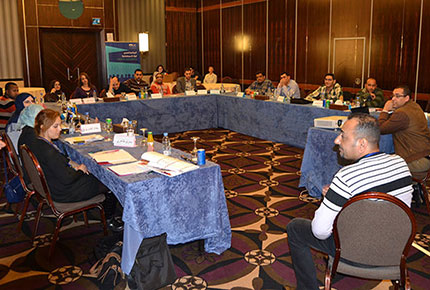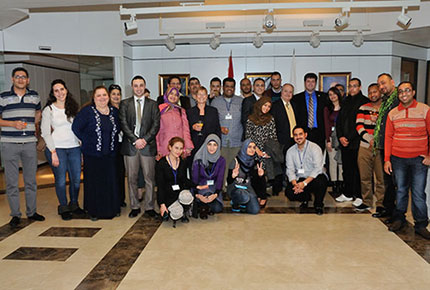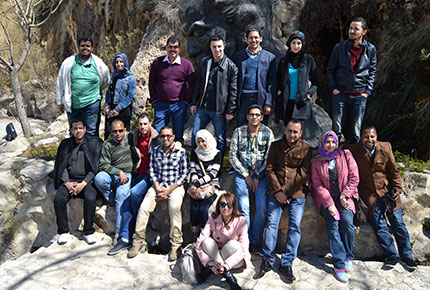Building regional leaders, building hope
With its second annual Leaders for Democracy Fellowship program, LAU forms a network of mid-career activists from the MENA region.

This year, participants came from Yemen, Tunisia, Morocco, Libya, Lebanon, Kuwait, Jordan, Iraq, Egypt and Algeria.
“I am going back to Algeria with a great added-value,” says Sihem Hemmache, an Algerian lawyer, human rights activist and founding member of a new political party. “These four weeks spent at LAU have taught me a lot about the region and the common problems our countries face,” she adds.
Together with 18 other participants in the second annual Leaders for Democracy Fellowship (LDF) program at LAU, Hemmache is gearing up to complete a six-week internship in an organization of her choice in Lebanon. “It is a unique learning experience that creates a real network of regional young leaders who get to know more about each other’s cultures and build something together,” she enthuses.
The LDF Arabic program focuses on theoretical teaching about state democratization, civil society, leadership, conflict resolution and related topics through lectures, faculty-led simulations and skill-building exercises. It then allows the young leaders, who all come to Lebanon from the MENA region, to take their learning experience further through an exchange of expertise within the framework of the action-oriented institutions in which they intern.
Funded by the U.S. Department of State’s Middle East Partnership Initiative in parallel with an English-language version of the program in the U.S., the project is subcontracted by Syracuse University (SU) and coordinated by LAU’s University Enterprise Office (UEO) in close collaboration with the Department of Social Sciences.
“I come to Beirut during each session to meet the new group of participants,” says Dr. Julia Ganson, LDF Program Manager at SU’s Maxwell School of Citizenship and Public Affairs. Ganson also lends support to the program management team at LAU and helps troubleshoot any problems they might face. “But I also learn new strategies to borrow and apply to the U.S. program, as well as try to build the relationship between our two institutions,” she says.
For UEO and LAU-LDF Program Director Dr. Walid Touma, the partnership presents LAU with the opportunity to engage with both one of the leading U.S. schools of public policy and MEPI on such key regional issues as democracy, leadership and inter-cultural communication. LAU-LDF Program Manager Dr. Nabelah Haraty agrees. “This is an enriching experience for all parties involved. It is an exchange of expertise at all levels,” she says. “As professors we also find ourselves learning a lot from the participants about their own heritage, their experience, their culture and their ways of communication.”
On March 20, the representatives of numerous local organizations met with LDF participants to discuss the program’s internship component. Among other connections established that day, Adnan Melki — a member of the Lebanese Association for Democratic Elections (LADE) — sat with Rachid al Oubousta, a Moroccan political activist involved in projects strengthening the capacity of civil society leaders in Southern Morocco. For al Oubousta, the decision to intern with LADE was a natural choice: “I am interested in knowing more about best practices related to the issue of democratic and transparent elections, and LADE’s rich experience in this area speaks for itself.”
As the young fellows move on from the campus-based training to their internships, Dr. Imad Salamey, LAU-LDF Program Coordinator, is filled with hope. “Watching these leaders learn, exchange and interact makes me believe that they will prevail over the extremism and violence our region is witnessing,” he says, adding, “This is where investment needs to be allocated.”
More
Latest Stories
- LAU Family Medicine Graduates to Benefit from a Partnership With Nova Scotia
- AKSOB Assistant Professor Shares Her Vision for the Future of Learning
- LAU Simulation Models Celebrate 20 Years of Learning, Leadership and Service
- The School of Engineering Hosts the Lebanese Electromagnetics Day
- LAU Stands Out on the Sustainability Scores
- Michael Haddad Walks Again for Climate Change and Food Security
- AI in Clinical Practice: Tools, Ethics, and the Human Touch
- Interior Design Students Honor the Past by Designing the Future



